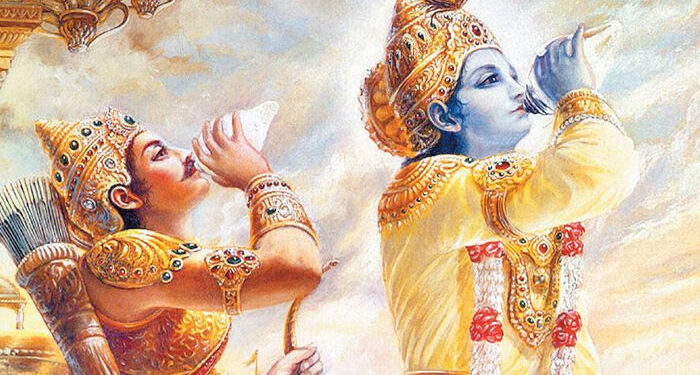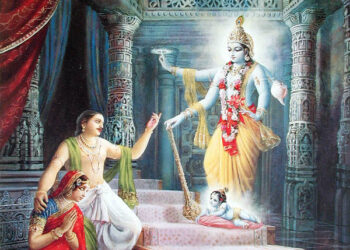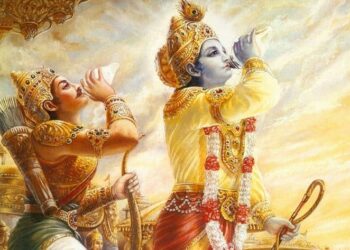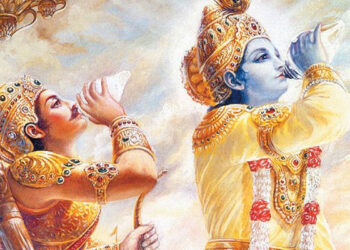TEXT 54
arjuna uvāca
sthita-prajñasya kā bhāṣā
samādhi-sthasya keśava
sthita-dhīḥ kiṁ prabhāṣeta
kim āsīta vrajeta kim
SYNONYMS
arjunaḥ uvāca—Arjuna said; sthita-prajñasya—of one who is situated in fixed Kṛṣṇa consciousness; kā—what; bhāṣā—language; samādhi-sthasya—of one situated in trance; keśava—O Kṛṣṇa; sthita-dhīḥ—one fixed in Kṛṣṇa consciousness; kim—what; prabhāṣeta—speaks; kim—how; āsīta—does remain still; vrajeta—walks; kim—how.
TRANSLATION
Arjuna said: O Kṛṣṇa, what are the symptoms of one whose consciousness is thus merged in transcendence? How does he speak, and what is his language? How does he sit, and how does he walk?
PURPORT
As there are symptoms for each and every man, in terms of his particular situation, similarly one who is Kṛṣṇa conscious has his particular nature—talking, walking, thinking, feeling, etc. As a rich man has his symptoms by which he is known as a rich man, as a diseased man has his symptoms by which he is known as diseased, or as a learned man has his symptoms, so a man in transcendental consciousness of Kṛṣṇa has specific symptoms in various dealings. One can know his specific symptoms from the Bhagavad-gītā. Most important is how the man in Kṛṣṇa consciousness speaks; for speech is the most important quality of any man. It is said that a fool is undiscovered as long as he does not speak, and certainly a well-dressed fool cannot be identified unless he speaks, but as soon as he speaks, he reveals himself at once. The immediate symptom of a Kṛṣṇa conscious man is that he speaks only of Kṛṣṇa and of matters relating to Him. Other symptoms then automatically follow, as stated below.
TEXT 55
śrī-bhagavān uvāca
prajahāti yadā kāmān
sarvān pārtha mano-gatān
ātmany evātmanā tuṣṭaḥ
sthita-prajñas tadocyate
SYNONYMS
śrī—bhagavān uvāca—the Supreme Personality of Godhead said; prajahāti—gives up; yadā—when; kāmān—desires for sense gratification; sarvān—of all varieties; pārtha—O son of Pṛthā; manaḥ-gatān—of mental concoction; ātmani—in the pure state of the soul; eva—certainly; ātmanā—by the purified mind; tuṣṭaḥ—satisfied; sthita-prajñaḥ—transcendentally situated; tadā—at that time; ucyate—is said.
TRANSLATION
The Supreme Personality of Godhead said: O Pārtha, when a man gives up all varieties of desire for sense gratification, which arise from mental concoction, and when his mind, thus purified, finds satisfaction in the self alone, then he is said to be in pure transcendental consciousness.
PURPORT
The Bhāgavatam affirms that any person who is fully in Kṛṣṇa consciousness, or devotional service of the Lord, has all the good qualities of the great sages, whereas a person who is not so transcendentally situated has no good qualifications, because he is sure to be taking refuge in his own mental concoctions. Consequently, it is rightly said herein that one has to give up all kinds of sense desire manufactured by mental concoction. Artificially, such sense desires cannot be stopped. But if one is engaged in Kṛṣṇa consciousness, then, automatically, sense desires subside without extraneous efforts. Therefore, one has to engage himself in Kṛṣṇa consciousness without hesitation, for this devotional service will instantly help one onto the platform of transcendental consciousness. The highly developed soul always remains satisfied in himself by realizing himself as the eternal servitor of the Supreme Lord. Such a transcendentally situated person has no sense desires resulting from petty materialism; rather, he remains always happy in his natural position of eternally serving the Supreme Lord.


















